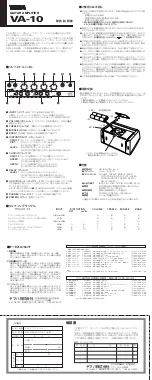
We follow a policy of continuous advancement in development. For this reason all or part of specifications
& designs may be changed without prior notice.
All output power ratings
are RMS Watts @ 14,4
VDC, CEA standard
13
Specifications
Number of channels
Amplifier class
Power output RMS in 1 ohm
Power output RMS in 2 ohm
Power output RMS in 4 ohm
Power output RMS 4 ohm bridged
Signal to noise ratio, A-weighted
Damping factor
THD @ 3 W, 20 Hz-300 Hz
THD @ 400 W, 100 Hz
THD @ 3 W, 20 Hz-20 kHz
THD @ 85 W, 1 kHz
THD @ 100 W, 1 kHz
Frequency response
Input impedance, low level
Input sensitivity - variable
Input comp mode - direct in
Input impedance, high level
High level input
Filter low pass variable
Filter high-pass adjustable
Filer low-pass adjustable
* can be switched in/out
Bass boost @ 45 HZ
Subsonic filter
Phase switch
Remote sub level control
Power consumption, idle
Power consumption, max
Fuse (no internal fuse used)*
Dimensions HxWxD (mm)
Dimensions HxWxD (inch)
Extra
Power terminal size
Minimum rec. cable size
Speaker terminal size**
Weight
*/ Depending on cable size
**/ OFC Copper
1
D
1000 W
800 W
450 W
-
94 dB
>150
<0,06%
<0,09%
-
-
-
10 Hz - 250 Hz
22 kOhm
1 - 4 V
2V rms / 400 W
45 Ohm
Yes (auto start)
35-250 Hz / 12 & 24 dB
-
-
0 - +6 dB
30 Hz ON/OFF
0 / 180°
Yes, with 5 M cable
1,2 A
102 A
100 A
54x129x370
2,1x5,1x14,6
Internal cooling fan
2 AWG / 35 mm²
4 AWG / 20 mm²
12 AWG / 10 mm²
2,9 kg
2
AB
-
2 x 180 W
2 x 110 W
1 x 360 W
116 dB
>150
-
-
<0,019%
-
<0,02%
10 Hz - 50 kHz
6 kOhm
1 - 4 V
2V rms / 100 W /ch
45 Ohm
Yes
-
50 - 500 Hz
50 - 500 Hz
0 - +6 dB
-
-
-
0,5 A
43 A
40 A
54x129x260
2,1x5,1x10,2
Internal cooling fan
2 AWG / 35 mm²
8 AWG / 10 mm²
10 AWG / 6 mm²
1,87 kg
4
AB
-
4 x 130 W
4 x 90 W
2 x 260 W
116 dB
>300
-
-
<0,065%
<0,065%
-
10 Hz - 60 kHz
5 kOhm
1 - 4 V
2V rms / 85 W /ch
45 Ohm
Yes
-
50 - 500 Hz
50 - 500 Hz
-
-
-
-
0,7 A
64 A
60 A
54x129x320
2,1x5,1x12,6
Internal cooling fan
2 AWG / 35 mm²
4 AWG / 20 mm²
10 AWG / 6 mm²
2,4 kg
Signature 1
Signature 2
Signature 4
Summary of Contents for Signature S1
Page 1: ...USER MANUAL ...
Page 16: ......


































